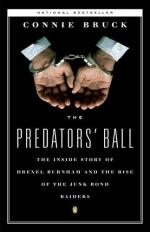
|
| Name: _________________________ | Period: ___________________ |
This quiz consists of 5 multiple choice and 5 short answer questions through Part 3: Chapter 12, Milken's Money Machine.
Multiple Choice Questions
1. How did Milken break into the Las Vegas gambling business community?
(a) Milken lowered his commissions to get large casino business.
(b) Milken traveled every weekend to gamble in Las Vegas.
(c) Milken showed the casino owners how they could double their income.
(d) Milken helped Steve Wynn raise the funds he needed to build in Atlantic City.
2. Why was the Revlon takeover a landmark case for Perelman and Drexel?
(a) The most impassioned corporate defenders were united against Milken's onslaught.
(b) This one was almost as large as the Phillips Petroleum takeover.
(c) If Perelman won, it would set the precedent for other such takeovers.
(d) Because of its base of female customers, Revlon was vulnerable to bad publicity.
3. What did Joseph label his brainstorming information about LBOs?
(a) the X-Files
(b) the M&A files
(c) Air Fund or the highly confident letter
(d) the CIA files
4. How did the firm now have equity stakes in most of the companies that it financed?
(a) by buying stakes in many companies instead of financing them
(b) by demanding larger stakes in the companies
(c) by using the firm's capital to finance the companies
(d) by swapping Chinese paper for stock in the companies
5. What influenced Milken to become interested in low grade bond portfolios?
(a) a course he took at Wharton
(b) the Morgan report on bond yields
(c) an unexpected profit from his own low grade bonds
(d) the Hickman study, an analysis of bond yields
Short Answer Questions
1. What was the largest bankruptcy in 1986?
2. What did Grant continue to predict?
3. What concept did Milken continue to support?
4. What commission did Drexel make on these funds?
5. Where was much of the money coming from for takeovers in the 1980s?
|
This section contains 377 words (approx. 2 pages at 300 words per page) |

|




